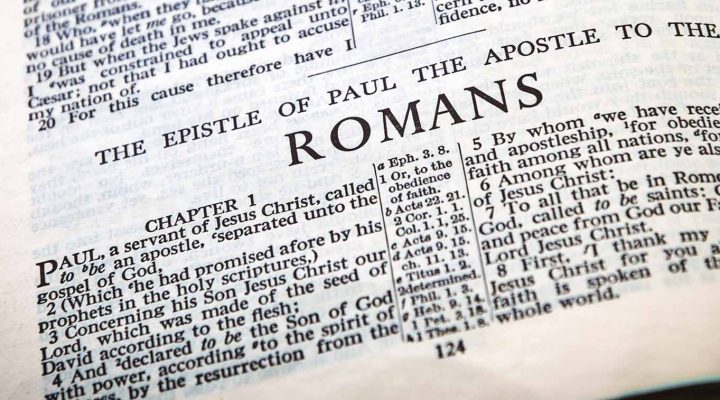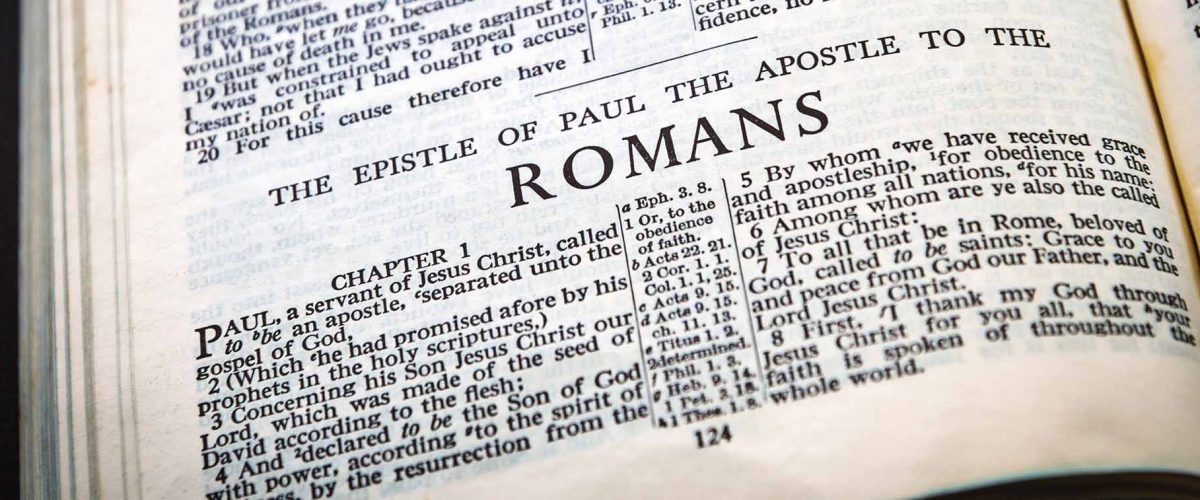The familiar division of the Bible into chapters and verses helps us locate our Scriptures of interest. Yet, it took 1,200 to 1,500 years before translators and publishers put them there; and, thankfully so. However, like dishwashers, iPhones and all other human devices, these helpful tools can fail us.
One example is the division between chapters one and two of the New Testament book of Romans. That division blocks us from two emotional experiences Paul found important.

Russell G. Waldrop
First, he raises and highlights our smug self-righteousness so that we can feel it, even bask in it while judging those whom he describes. Like the person in Jesus’ parable who thought: “I am not like other people,” we can also think, “I am not like those sinners Paul describes.”
Delightful, isn’t it, that feeling of superiority that comes when we compare ourselves to others who, as the old saying goes, “don’t love the Lord like we do”?
Haven’t felt it yet? Let’s examine our emotions as Paul presents 30 categories of people whom we think we are “better than.” Some of them live close to us; others work down the hall; what’s more, a few of them sit near us in church. Glance a few pews over. See them there?
Yes, they are located in chapter one of Romans. Paul describes them as “filled with every kind of wickedness, evil, covetousness, malice, envy, murder, strife, deceit, craftiness; they are gossips, God-haters, insolent, haughty, boastful, inventors of evil, rebellious toward parents, foolish, faithless, heartless, ruthless” as well as those who applaud others who practice these sins.
“Since chapter one ends with a period, we may assume Paul is done. No, he isn’t.”
Since chapter one ends with a period, we may assume Paul is done. No, he isn’t. He has just finished his first goal: to have us feel the full force of our own self-righteous “shock” at other people’s sins. But why are we shocked?
The Bible is full of vivid descriptions of human sin, even that “all have sinned.” Rather than feel shocked, we should locate ourselves on Paul’s list. Instead, these chapter-verse divisions divert us from identifying with his “wretched man that I am” self-evaluation.
We may point out certain sins or sinners without seeing ourselves. Or we may rank them from “worst” to “least” sins (“murder” to “craftiness)” and recognize the least sinful as our own. Who doesn’t mind admitting to a little “craftiness”?
This can be prevented by pushing past the 1:32 artificial chapter division and reading on into chapter 2, which begins, “Therefore you have no excuse, whoever you are.”
That springs Paul’s trap on us. He continues: “When you judge others; for in passing judgment on another you condemn yourself, because you, the judge, are doing the very same things.”
That pulls the judicial robes off us, doesn’t it? Notice he’s not warning that we “might someday” do the same things as those we judge. We “are doing the very same things” as those we judge (present tense).
Remember the Last Supper, when Jesus informed everyone that one of them would betray him? Rather than accuse one another, each one asked, “Is it me, Lord?” One of their brighter moments, wasn’t it?
A similar response could be ours if we were to read beyond the first chapter of Romans into chapter two. A simple “Uh-Oh! That’s me,” response might be sufficient to get Paul’s point.
Indeed, where are we on Paul’s list?
Bible publishers may also fail us through another “study aid,” specifically, their comments sprinkled throughout the text. They can seem so normal and helpful that we take them as Scripture itself. They aren’t, and they can mislead us.
A classic example is their insertion of “The Parable of the Good Samaritan” above the famous parable that does not contain that phrase. Jesus did not call the Samaritan “good.” Many publishers have, though, and they left us with a problematic “heading” above Luke 10:25 (See NKJV, TEV, NET, JB, CEV, NIV, KNT, NRSV, NAB, Beck, NAS.)
Why is that a problem?
“Bible studies, Sunday school teaching and so many sermons call the Samaritan something Jesus never called him: ‘good.’”
First, it leaves an indelible mark in the fields of law, literature, art and, of course, Bible studies, Sunday school teaching and so many sermons that call the Samaritan something Jesus never called him: “good.” The accompanying misrepresentations are long lasting and may never be completely remedied.
Second, Samaritan history. They had broken away from the Jewish tribes and intermarried with non-Jewish religions at a time closer to Moses than to Jesus. They had for centuries read a different Scripture, worshiped in a different place, held different beliefs and carried daily social resentment toward Jews who felt the same way toward them. There were no “good Samaritans” then.
Purposefully, then, Jesus chose a hated Samaritan to embarrass Jewish leaders by implying that he represented salvation, not them.
Third, when the misnomer “Good” Samaritan is carried over into the experience of “neighbors,” another false assumption attaches to it. Specifically, how do we measure goodness in ourselves as a neighbor?
In measuring, defining, judging a “good neighbor,” we likely still rely on the methodology that was used on us from our grammar school on to whatever levels of higher education we achieved. Yes, those “letter grades” with the little plus and minus signs attached to them. Remember the red ink, too?
Jesus’ evaluation is not on the letter grade system. It’s a pass/fail. We either are a neighbor or we are not a neighbor. He asked the recipient of his parable: “Now, who was the neighbor?” with no self-serving grading scale. No “degrees of goodness” can hide our failures in being a neighbor.
Finally, though, we must cease our criticisms and be thankful and supportive of Bible publishers who “add to Scripture” some very helpful guidelines for finding and interpreting it. Theirs is a fluid field; that is, new discoveries in the biblical languages of Greek, Hebrew and a bit of Aramaic offer new insights into how our modern translations should be paragraphed, indented and divided into chapters and verses.
Likewise, their comments within Scripture, while sometimes not easily distinguishable from Scripture itself, are basically reliable and helpful.
Theirs is not a pass/fail task. It is more of a “getting it better and better” process. We owe them much gratitude and a merciful “grade” for their work.
Russell G. Waldrop is a retired hospital and prison chaplain, pastoral counselor and licensed professional counselor in Waynesboro, Va.
Related articles:
My quest to find the word ‘homosexual’ in the Bible | Opinion by Ed Oxford
After 30 years, the NRSV gets an update: Here’s what that means
I knew the truth about women in the Bible, and I stayed silent | Opinion by Beth Allison Barr


